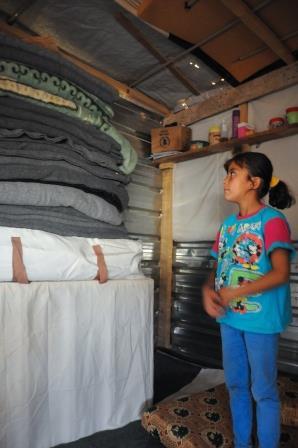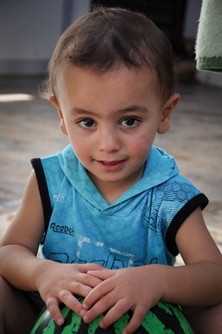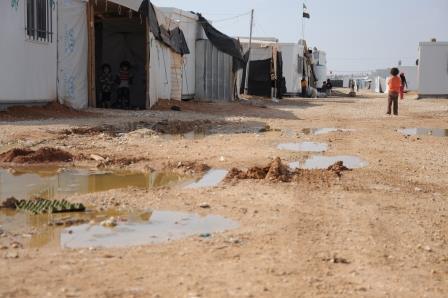by Lauren Fisher, emergency communications, World Vision
"During the day it is fine. We have a heater," Myada, a mother of four, says. "But at night we just pile more and more blankets on the children when they are sleeping."
Myada and her children, ages 14 to 9 live in a tent in Za'atari Camp in Jordan. While refugees in Lebanon are facing the biggest winter storm to hit the country in years, families in Jordan are seeing temperatures dip to near freezing and wondering if they may be next.
Turning their heater off at night, just when it's most needed, may seem counterintuitive. But for this family it's survival. Last winter the family saw seven of their neighbor's tents burn down. A cold, drafty tent is better than nothing at all in the dead of winter.
"We have no winter clothes for me and the children," Fo'ad says.
Even worse, they say, is the flooding. Winter in Jordan means rain and even snow. Last year rain left many Za'atari residents with knee-deep water in their tents. Fo'ad tells me even a short rain earlier in the week soaked their mattresses and ruined all of their bread. He says he can't imagine what another winter of heavy rain will mean for him and his family.
The situation is even more desperate for those with younger children. 20-month old Nouras' name translates to 'gull' — a bird that needs to be free, scampering from place to place. If you've ever spent time with a 20-month-old toddler, it's a name that makes sense.
"I am scared. The weather is getting colder," Anwar, the father, says.
Salam smiles when she talks about the pregnancy, but that smile quickly passes when asked if she's worried.
"I am a little bit scared," she says. "Every woman who is pregnant here is a bit scared. The most frightening part is afterwards - with a newborn. The cold weather, the food and the condition of the food and wondering if it will all be ok for the baby."
These families' stories are not unusual. More than 2.2 million people have fled to neighboring countries to escape the violence. Many are living in tented settlements, camps or poorly-equipped apartments that offer little protection from the cold. Within Syria, many of the 6.5 million internally displaced are facing similar challenges.
As one Syrian father in Jordan explained, "We left Syria because our house was destroyed and we were scared for our children. And now we're scared of the cold. Perhaps it's better to be killed by someone than to watch your children die of the cold." In his apartment, there is no heat and no hot water.
In Jordan they have a saying for late December to February — "the hardest forty days." As the temperatures drop to freezing and the rain and snow comes, many are hoping the "hardest forty days" are not more than their families can handle.


